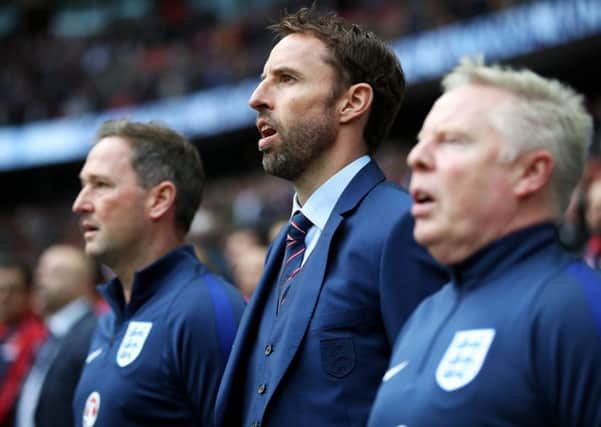Richard Sutcliffe: '˜I was here to do a job for the country. I wasn't too romantic about it' '“ Gareth Southgate


A PENNY – or, perhaps more appropriately considering the going rate he recently requested to speak publicly, forty million of them – for Sam Allardyce’s thoughts on Saturday night?
Malta’s visit to Wembley should have been the proudest moment of the 61-year-old’s career in football, a culmination of all the hard work that took him from the dugout in Limerick to the highest office in English football via stints in all four divisions.
Advertisement
Hide AdAdvertisement
Hide Ad‘The journey starts with us all pulling together,’ Allardyce had said in the FA radio advert to push sales when tickets were first put on general sale in mid-August. The same slogan had been printed on 4,000 t-shirts that were due to be handed out to supporters at the game, while a mosaic of coloured cards spelling out a similar message was also planned at one end of the national stadium.
To someone who made no secret of his pride at getting “the top job” in the English game, such a prospect would surely have been something approaching football utopia.
Alas, Allardyce was elsewhere on Saturday after losing his job in the fall-out from an undercover sting by a national newspaper that caught the then Three Lions chief negotiating a £400,000 speaking engagement deal and, much more damagingly, advising a group of businessmen how to “get around” the FA’s transfer rules.
Gareth Southgate, instead, occupied the home dugout at Wembley as England huffed and puffed their way to a victory over a team ranked 176th in the world which was still more comfortable than the final score suggests.
Advertisement
Hide AdAdvertisement
Hide AdIt was a gentle start for the former Middlesbrough defender and one that he handled in an understated way that contrasted sharply with what we perhaps could have been expected if Allardyce had still been in situ.
“I was very proud but I wasn’t here to be a tourist,” said the interim manager afterwards when asked about his bow at the helm of the senior side.
“I was here to do a job for the country. I wasn’t too romantic about it, I knew there was a job to be done.
“I was immensely proud, but I was aware of the responsibility and I wanted the players to get a sense of how we wanted to do it. And at times I felt the players did that but we know there is room for improvement.”
Advertisement
Hide AdAdvertisement
Hide AdAs expected from someone who, as a player, got on with his job in a quiet and professional manner, there was no grand entrance before kick-off.
Where some managers would have delayed their own walk down the tunnel to ensure all the focus was on them, Southgate merely strolled out amid a huddle containing six or seven backroom staff.
He did sing along to every word of the national anthem but, again, this was not done for effect.
That Southgate’s bow as manager of the senior side should come at Wembley was fitting. He had plenty of history with the old stadium.
Advertisement
Hide AdAdvertisement
Hide AdNo-one, least of all the man himself, will forget ‘that’ penalty at Euro ’96 but Southgate also featured prominently in the final days of the Empire Stadium.
He was in the England side that signed off under the Twin Towers with a 1-0 defeat against Germany in 2000, four months after being unable to prevent Aston Villa losing the old stadium’s last FA Cup final to Chelsea.
In between those two disappointments, Southgate was also in the crowd for the final concert before Wembley’s demolition to make way for the gleaming £787m stadium that now houses the England team.
Bon Jovi were performing that night and it is surely fair to say that the past few weeks have seen Southgate’s employers operating on a wing and a prayer as opposed to the band’s most famous track.
Advertisement
Hide AdAdvertisement
Hide AdSouthgate’s willingness to take on the role just a few months after making it clear he was not interested in a caretaker stint got the FA out of a hole and his first assignment could not have been any easier.
Not that this was evident in the opening 25 minutes or so.
Initially confined to the bench alongside Sammy Lee, Southgate soon moved towards the touchline almost as if hoping to inspire a breakthrough.
It finally arrived just before the half-hour when Daniel Sturridge expertly guided a header into the corner of Andrew Hogg’s net.
The guttural roar and animated celebration betrayed both a sense of euphoria and relief on the part of the interim manager.
Advertisement
Hide AdAdvertisement
Hide AdBy the time England added a second through Dele Alli, Southgate was back on the bench. His fist-pump this time was more reminiscent of the rather drippy efforts by Tim Henman during his Wimbledon heyday.
Something to work on in the future, along with the need for his players to maintain a good tempo in games for longer than 45 minutes.
Still, as debuts go, it was a satisfying one. At the final whistle, there was a quick clap of the crowd and then Southgate was gone.
Much stiffer challenges await next month when Scotland and then Spain come to town. Only then will Wembley get to see whether Southgate really is the man to lead the country forward in the long-term.